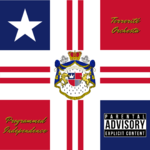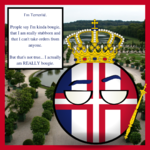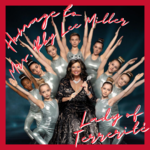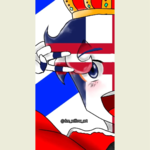Kingdom of Terrerité
Kingdom of Terrerité Reino de Terrerité (Spanish) | |
|---|---|
| Motto: For the King and the Edict (French & Spanish: Pour le Roi et la Loi & Por el Rey y la Ley) | |
| Anthem: Land of the Truth | |
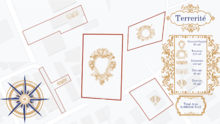 Territories of the Kingdom of Terrerité | |
| Capital and largest city | Terrerité |
| Official languages | English Français Español |
| Religion | Atheism LaVeyan Satanism |
| Demonym(s) | Terrerita Terreritas |
| Government | Judicial Monarchy |
• King | King Ignis Audeladroit I |
• President of the Royal High Court of Justice of Terrerité | Alejandro Negropezau |
| Establishment | |
• Independence of Terrerité | 6 February 2021 |
| Population | |
• 2021 census | 47 citizens |
| Currency | USD |
| Time zone | GMT-4 (CLT) |
| Date format | dd-mm-yyyy |
| Microcode | TR |
The Kingdom of Terrerité ([/tɛ.rɛ.ri'tɛ/] ![]() (Listen) (help·info)), more commonly known as Terrerité, claims to be a sovereign state, in the category of micronations, which mainland territory is located in Chile, South America with enclaves in Brazil and Monaco.
(Listen) (help·info)), more commonly known as Terrerité, claims to be a sovereign state, in the category of micronations, which mainland territory is located in Chile, South America with enclaves in Brazil and Monaco.
Terrerité was founded on 6 February 2021 by a group of three university friends, lawyers, communicators and politicians under the idea of the freedom to choose your own nationality if in disagreement with the decisions of the nation you were born. The Kingdom's form of government is a Judicial Monarchy in which the current monarch Ignis Audeladroit I has the executive and legislative power while an independent organ, the royal high court of justice of Terrerité, is the head of the judicial power.[1]
The kingdom consists of 5 territories scattered in the eighth and sixteenth regions of Chile within which the different administrative activities of the Terrerité take place, such as the tobacco harvest and the tasks of government administration.
Etmyology
Terrerité is a combination of 2 french words, terre and verité which means earth and truth respectively. Therefore, Terrerité means the land of the truth thus being an allusion to the idea of Terrerité, a nation in which the facts are the ones that guide public policies instead of lobbyists and pressure groups.
The other four administrative regions of the kingdom of Terrerité have by name a combination between the prefix terre and some characteristic of the land in its french translation such as the existence of rivers for Terrivier, hills in Terrateur, darkness in Terrombre and, in the case of Tebrrûlé, the fact that it was acquired by the Terrerité government after the fire that swept through the land.
History
The germ that would later engender Terrerité is rooted when 3 university companions, among whom are currently King Ignis Audeladroit I and the president of the royal high court of justice of Terrerité Lord Alejandro Negropezau, who got involved in the micronational community of Sealand [2] acquiring a noble title. As lords of Sealand, the three founder fathers started planning and own nation to rule with logic, liberty and lust.
The third's founder father name it's only known by Ignis and Alejandro who have not revealed the identity of their partner due to the fact that he stated the desire to remain anonymous. After his death in 2020 due to COVID-19, the rest of the founding fathers decided to start the Terrerité project, thus always respecting the will of the deceased to remain anonymous.
Each original member of Terrerité proposed a value to serve as a conceptual pillar for the nation. Alejandro brought freedom, wanting to claim his heritage as a person of colour, Ignis built the logic in the country by proposing a nation free from biases where religion, tradition and traditional political ideas did not dictate the laws but instead were logic, science and the truth the values that exalted the nation, finally, the third founding father decided to add lust as a pillar, understood not only as sexual liberation but also as elegance and sophistication.
The Political Constitution of the Kingdom of Terrerité was written and promulgated the 6 February 2021. The establishment of the terreritan constitution has also proclaimed the independence of the kingdom of Terrerité against The Republic of Chile and, on the same date, the coronation of King Ignis Audeladroit I took place. The coronation started with a speech from the founder member Alejandro Negropezau, on which was read the full text of the recently promulgated constitution, and ended after 45 minutes with the oath of the king Ignis Audeladroit I.
On 24 May 2021 was added to the kingdom of Terrerité two new territories that were purchased from the State of Chile which added the total amount of 10.931,60 m2 which represented a total increase of 232.66% of the originally claimed as an independent area territory. Both lots of lands were located in a different region than the one in which the terreritan capital is, specifically in the countryside of the XVI region of Chile.
The kingdom of Terrerité became the first-ever micronation to have a published EP with the uploading of programmed independence on 23 September 2021.[3] Programmed independence is a 3 tracks record by the Terrerité orchesta the official national band. With programmed independence, the kingdom of Terrerité became the first Spotify verified micronation and also the first micronation to ever have music uploaded under its own name. Within a week of being published, the record get to more than 400 streams on Spotify and 1000 streams counting amazon music, iTunes, apple music, Spotify and other music streaming platforms combined.
Government and politics
Terrerité is the first judicial monarchy established worldwide. The Terrerité judicial monarchy divides the executive and legislative power on one hand and the judicial power on the other. The king acts as head of state and government concentrating for itself the executive and legislative power, in turn, the royal high court of justice of Terrerité is the main counterweight to the monarch, attributing the judicial power to it.
The citizen-led foreign affairs council is in charge of proposing, accepting and declining the recognition, alliances or treaties proposed to the kingdom of Terrerité but due to the nation early establishment it remains with no diplomatic relations with any other micro nor macro nations. Terrerité it's not associated with any broader micronational movement, organization or similar yet but has never closed the opportunity to do so.
The kingdom of Terrerité is in the second quadrant of the political compass, being an authoritarian and right-wing judicial monarchy. The government vigorously promotes money exchanges and how to generate profits through platforms such as Patreon and royalties from Spotify and Itunes.
Regarding the social spectrum, the secular character of Terrerité differentiates it from the conventional right. The kingdom does not enact religion as an argument on which to base its policies, the national government is pro LGBTQ+ rights and a constant promoter of the liberation of the right to possess weapons.
As prescribed by article 10 of the constitution of Terrerité, the nation has titles of nobility awarded to prominent citizens whose contributions to the nation are recognized by the government. In turn, to possess a title of nobility it is a requirement to be a terreritan citizen and this quality is obtained, upon application, with the letter of acceptance from the royal heraldic house of citizens of Terrerité and the designation of an own terrerita surname.
| Noble Title | Quantity | Surnames |
|---|---|---|
| Lord | 44 | Aerima, Al'est, Amielbutês, Avetruire, Bamistanté, Bétédan, Ciergerre, Comberre, Contrirende, Créheux, Dafié, Doblays, Dratiê, Enurdnt, Eteruditê, Fánouvetát, Forbeau, Frietan, Fussuaire, L'Opêete, Mitudiané, Mobâtissé, Mouchev, Nouvteur, Penoplés, Penoplés, Renorme, Rieconne, Soualeil. |
| Baron | 1 | P'lavefie |
| Count | 1 | L'angabaseur |
| Marquis | 0 | |
| Duke | 1 | Negropezau |
Founder Fathers
The 3 founding fathers of Terrerité are Ignis, Alejandro and The third a group of 3 friends, law students from the development university with the dream of building a nation that conforms to their vision of the world, the vision of a logical nation, free and of pleasures. The initial idea was that each founder father controlled one of the government powers, but with the early death of the third two of the powers, the executive and legislative, were concentrated on the king while the judicial stayed in charge of Alejandro.
| Portrait | Name | Charge | Age |
|---|---|---|---|

|
Ignis Audeladroit I | King of Terrerité | 22 |

|
Alejandro Negropezau | President of the Royal High Court of Justice of Terrerité | 22 |

|
The Third | None | Deceased |
Ignis Audeladroit is the current king of Terrerité, he was control over the executive and legislative powers and his contribution to the nation concept was logic. As a founding father, Ignis vision was to have a nation in which every law made sense and has a logical argument on which it is based such as truths that are verifiable by the senses and scientifically proven facts, he rejected all religion and traditional political parties biases in order to have a functional nation.
Alejandro Negropezau is the current president of the royal high court of justice of Terrerité controlling the judicial power of the nation. As a founding father, Alejandro envisioned a country for the free, where you have the liberty to trade as you want, say what you want and think what you want with the only restrictions being morals, good manners and public order.
The third founder father died from COVID-19 a year before Terrerité claimed its independence, he always expressed his will to stay anonymous and so his identity is unknown. His contribution to the nation was the lust understood as sexual liberation, the formal elegance of a monarchy and the good manners represented by the high class of citizens. He was intended to control the Terrerité legislative power.
Terrerité Defense Council
On 16 May 2021 king Ignis Audeladroit I establishes the Terrerité defence council [4] whose jurisdiction corresponds to the entire Terrerité territory.

The powers of the Terrerité defence council are:
- 1. Recognize, explore, investigate, and propose foreign territory to claim it as belonging to Terrerité to exercise its sovereignty. These territories can only be from the private property of a citizen of Terrerité willing to assign it or territory not claimed by any natural or legal person.
- 2. Defend by means of the legitimate force conferred by the power of empire all the territory of Terrerité.
- 3. Promote and publicize the values of Terrerité throughout the globe with special emphasis on what is prescribed by article 2 of the political constitution of the kingdom of Terrerité, which establishes that the kingdom of Terrerité is a free, independent, indivisible, and constantly expanding State.
The duties of the Terrerité defence council are:
- 1. Safeguard and expand the sovereign territory of Terrerité.
- 2. Protect the person of the king.
- 3. Respect the royal family and the word of the king.
- 4. Respect the rules prescribed by this royal decree. (RD N°2)
- 5. Respect the rules prescribed by the political constitution of Terrerité.
The Terrerité defence council is chaired by the royal general field marshal who will be invested in accordance with articles 6 and 13 number 7 of the political constitution of the kingdom of Terrerité. The royal general field marshal will have under his tutelage all the remaining members of the Terrerité defence council.
Terrerité Foreign Affairs Council
On 18 May 2021, king Ignis Audeladroit I establishes the Terrerité foreign affairs council.[5] The Terrerité foreign affairs council is chaired by the royal chancellor who will be investigated in accordance with articles 6 and 13 number 7 of the political constitution of the kingdom of Terrerité. The royal chancellor shall have under his tutelage all the remaining members of the Terrerité foreign affairs council.
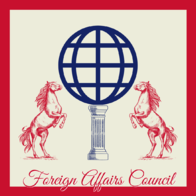
The powers of the Terrerité foreign affairs council are:
- 1. Receive proposals for recognition, alliances, and treaties from other States.
- 2. Study, analyze and explore proposals for recognition, alliances and treaties from other States that have been officially received.
- 3. To deny full rights of requests for recognition, alliances, and treaties when they attack the political constitution of Terrerité or any of its royal decrees.
- 4. Submit to the king proposals for recognition, alliances and treaties that meet national standards and that do not contravene Terrerité's standards.
- 5. Accept, upon express acceptance of the king, the relevant recognitions, alliances, and treaties.
- 6. To offer other States recognition, alliances and treaties upon express acceptance of the king.
The duties of the Terrerité Foreign Affairs Council are:
- 1. Keep the image of the kingdom of Terrerité immaculate and dignified.
- 2. Inform the king and the community of all but quarterly all acknowledgements, alliances and treaties accepted or rejected.
- 3. Respect the royal family and the king's word.
- 4. Respect the rules prescribed by this royal decree. (RD N°3)
- 5. Respect the rules prescribed by Terrerité's political constitution.
Democracy Index
The democracy index is an index compiled by the economist intelligence unit (EIU), the research division of the economist group, a UK-based private company. The index is self-described as intending to measure the state of democracy in countries and territories.[6]
The index is based on 60 indicators grouped in five different categories, measuring pluralism, civil liberties and political culture. In addition to a numeric score and a ranking, the index categorises each country into one of four regime types: full democracies, flawed democracies, hybrid regimes and authoritarian regimes.
The Terrerité government in 2021 has submitted to the questions that make up the EIU's democracy index; landed on a micronational theoretical framework, resulting in a hybird regime.
| Rank | Country | Score | Electoral process and pluralism |
Functioning of government |
Political participation |
Political culture |
Civil liberties |
Regime type |
Region | Statistics
company |
Changes from last year |
|---|---|---|---|---|---|---|---|---|---|---|---|
| 15 | 5.9 | 6.3 | 6.4 | 5.6 | 3.8 | 7.3 | Hybrid regime | South America | Kingdom of Terrerité Government | Score: |
| Factors | Number of the Question | Question | Answer | Points | |
|---|---|---|---|---|---|
| Electoral process and pluralism | 1 | Are elections for the national legislature and head of government free?
Consider whether elections are competitive in that electors are free to vote and are offered a range of choices. |
A single-party system or major impediments exist (for example, bans on a major party or
candidate). |
0 | |
| 2 | Are elections for the national legislature and head of government fair? | No major irregularities in the voting process. | 1 | ||
| 3 | Are municipal elections both free and fair? | Are free and fair. | 1 | ||
| 4 | Is there universal suffrage for all adults? Bar generally accepted exclusions (for example, non-nationals; criminals; members of armed
forces in some countries). |
Yes. | 1 | ||
| 5 | Can citizens cast their vote free of significant threats to their security from state or non-state
bodies? |
Yes. | 1 | ||
| 6 | Do laws provide for broadly equal campaigning opportunities? | Formally, yes, but, in practice, opportunities are limited for some candidates. | 0.5 | ||
| 7 | Is the process of financing political parties transparent and generally accepted? | Yes. | 1 | ||
| 8 | Following elections, are the constitutional mechanisms for the orderly transfer of power from one
government to another clear, established and accepted? |
All three criteria are satisfied. | 1 | ||
| 9 | Are citizens free to form political parties that are independent of the government? | No. | 0 | ||
| 10 | Do opposition parties have a realistic prospect of achieving government? | No. | 0 | ||
| 11 | Is potential access to public office open to all citizens? | Yes. | 1 | ||
| 12 | Are citizens allowed to form political and civic organisations, free of state interference and
surveillance? |
No. | 0 | ||
| Functioning of government | 13 | Do freely elected representatives determine government policy? | Exercise some meaningful influence. | 0.5 | |
| 14 | Is the legislature the supreme political body, with a clear supremacy over other branches of
government? |
Yes. | 1 | ||
| 15 | Is there an effective system of checks and balances on the exercise of government authority? | No. | 0 | ||
| 16 | Government is free of undue influence by the military or the security services | Yes. | 1 | ||
| 17 | Foreign powers and organisations do not determine important government functions or policies. | Yes. | 1 | ||
| 18 | Do special economic, religious or other powerful domestic groups exercise significant political
power, parallel to democratic institutions? |
No. | 0 | ||
| 19 | Are sufficient mechanisms and institutions in place for ensuring government accountability to the
electorate in between elections? |
No. | 0 | ||
| 20 | Does the government’s authority extend over the full territory of the country? | Yes. | 1 | ||
| 21 | Is the functioning of government open and transparent, with sufficient public access to information? | No. | 0 | ||
| 22 | How pervasive is corruption? | Corruption is not a major problem. | 1 | ||
| 23 | Is the civil service willing to and capable of implementing government policy? | Yes, but serious flaws exist. | 0.5 | ||
| 24 | Popular perceptions of the extent to which citizens have free choice and control over their lives. | High. | 1 | ||
| 25 | Public confidence in government. | High. | 1 | ||
| 26 | Public confidence in political parties. | High. | 1 | ||
| Political participation | 27 | Voter participation/turn-out for national elections | Below 50%. | 0 | |
| 28 | Do ethnic, religious and other minorities have a reasonable degree of autonomy and voice in the
political process? |
No. | 0 | ||
| 29 | Women in parliament. | Less than 10%. | 0. | ||
| 30 | Extent of political participation. Membership of political parties and political non-governmental
organisations. |
Over 7% of population for either | 1 | ||
| 31 | Citizens’ engagement with politics. | Moderate. | 0.5 | ||
| 32 | The preparedness of population to take part in lawful demonstrations. | Moderate. | 0.5 | ||
| 33 | Adult literacy. | Over 90% | 1 | ||
| 34 | Extent to which adult population shows an interest in and follows politics in the news | High. | 1 | ||
| 35 | The authorities make a serious effort to promote political participation. | Yes. | 1 | ||
| Democratic political culture | 36 | Is there a sufficient degree of societal consensus and cohesion to underpin a stable, functioning
democracy? |
Yes. | 1 | |
| 37 | Perceptions of leadership; proportion of the population that desires a strong leader who bypasses
parliament and elections. |
High. | 0 | ||
| 38 | Perceptions of leadership; proportion of the population that desires a strong leader who bypasses
parliament and elections. |
Low. | 1 | ||
| 39 | Perceptions of rule by experts or technocratic government; proportion of the population that
would prefer rule by experts or technocrats. |
High. | 0 | ||
| 40 | Perception of democracy and public order; proportion of the population that believes that
democracies are not good at maintaining public order. |
High. | 0 | ||
| 41 | Perception of democracy and the economic system; proportion of the population that believes
that democracy benefits economic performance. |
Less than 60%. | 0 | ||
| 42 | Degree of popular support for democracy | Low. | 0 | ||
| 43 | There is a strong tradition of the separation of Church and State. | Yes. | 1 | ||
| Civil liberties | 44 | Is there a free electronic media? | Yes. | 1 | |
| 45 | Is there a free print media? | No. | 0 | ||
| 46 | Is there freedom of expression and protest (bar only generally accepted restrictions, such as
banning advocacy of violence)? |
Yes. | 1 | ||
| 47 | Is media coverage robust? Is there open and free discussion of public issues, with a reasonable
diversity of opinions? |
There is formal freedom, but a high degree of conformity of opinion, including through selfcensorship or discouragement of minority or marginal views. | 0.5 | ||
| 48 | Are there political restrictions on access to the Internet? | No. | 1 | ||
| 49 | Are citizens free to form professional organisations and trade unions? | Officially free, but subject to some restrictions. | 0.5 | ||
| 50 | Do institutions provide citizens with the opportunity to petition government to redress grievances? | No. | 0 | ||
| 51 | The use of torture by the state. | Torture is not used. | 1 | ||
| 52 | The degree to which the judiciary is independent of government influence.
Consider the views of international legal and judicial watchdogs. |
High. | 1 | ||
| 53 | The degree of religious tolerance and freedom of religious expression. | Low | 0 | ||
| 54 | The degree to which citizens are treated equally under the law. | Moderate. | 0.5 | ||
| 55 | Do citizens enjoy basic security? | Yes. | 1 | ||
| 56 | Extent to which private property rights are protected and private business is free from undue
government influence |
High. | 1 | ||
| 57 | Extent to which citizens enjoy personal freedoms. | High. | 1 | ||
| 58 | Popular perceptions on protection of human rights; proportion of the population that think that
basic human rights are well-protected. |
High. | 1 | ||
| 59 | There is no significant discrimination on the basis of people’s race, colour or religious beliefs. | Yes. | 1 | ||
| 60 | Extent to which the government invokes new risks and threats as an excuse for curbing civil
liberties. |
Low. | 1 |
Administrative regions
| Administrative Regions of Terrerité | ||||||||
|---|---|---|---|---|---|---|---|---|
| Flag | Name | Shortcode | Shortname | Macronational Location | Population | Languages spoken | Territory | Representative |

|
Terrerité (Capital) | TRC | Terrerité | 32 | Engish, French, Spanish | 92 m2 | King Ignis Audeladroit I | |

|
Terrauteur | TRU | Terrauteur | 3 | Spanish | 272 m2 | King Ignis Audeladroit I | |

|
Terrombre | TRO | Terrombre | 4 | English, Spanish | 152 m2 | King Ignis Audeladroit I | |

|
Tebrrûlé | TBR | Tebrrûlé | 7 | Spanish | 86 m2 | King Ignis Audeladroit I | |

|
Terrivièr | TRI | Terrivièr | 1 | Spanish | 66 m2 | King Ignis Audeladroit I | |
Geography and climate
Terrerité (Capital)
The climate in Terrerité is mild and generally warm and temperate. The rain in Terrerité falls mostly in the winter, with relatively little rain in the summer. This climate is considered Csb according to the Köppen-Geiger climate classification. The average temperature in Terrerité is 13.3 °C. The approximate rainfall is 839mm.
Precipitation is the lowest in January, averaging 6mm. In June, the precipitation reaches its peak, with an average of 183 mm. At an average temperature of 18.1 °C, January is the hottest month of the year. At 9.1 °C on average, July is the coldest month of the year.
Between the driest and wettest months, the difference in rainfall is 177 mm. The variation in annual temperature is around 9.0 °C. The month with the highest relative humidity is June (86.35%). The month with the lowest relative humidity is January (66.92%). The month with the highest number of rainy days is June (12.53 days). The month with the lowest number is January (1.20 days). Terrerité is in the southern hemisphere. Summer starts here at the end of January and ends in December.[7]
| Climate data for Terrerité (Capital) | |||||||||||||
|---|---|---|---|---|---|---|---|---|---|---|---|---|---|
| Month | Jan | Feb | Mar | Apr | May | Jun | Jul | Aug | Sep | Oct | Nov | Dec | Year |
| Average high °C (°F) | 23 (73) |
22.5 (72.5) |
21.1 (70) |
17.8 (64) |
14.8 (58.6) |
13 (55) |
12.3 (54.1) |
13 (55) |
14.5 (58.1) |
16.2 (61.2) |
18.8 (65.8) |
21.1 (70) |
17.3 (63.2) |
| Daily mean °C (°F) | 18.1 (64.6) |
17.7 (63.9) |
16.2 (61.2) |
13.4 (56.1) |
11.3 (52.3) |
10 (50) |
9.1 (48.4) |
9.6 (49.3) |
10.6 (51.1) |
12.2 (54) |
14.6 (58.3) |
16.5 (61.7) |
13.28 (55.9) |
| Average low °C (°F) | 13.6 (56.5) |
13.4 (56.1) |
12.1 (53.8) |
9.8 (49.6) |
8.4 (47.1) |
7.4 (45.3) |
6.3 (43.3) |
6.7 (44.1) |
7.2 (45) |
8.6 (47.5) |
10.5 (50.9) |
12.2 (54) |
9.68 (49.43) |
| Average Rainfall mm (inches) | 6 (0.24) |
12 (0.47) |
21 (0.83) |
52 (2.05) |
140 (5.51) |
183 (7.2) |
145 (5.71) |
126 (4.96) |
67 (2.64) |
47 (1.85) |
23 (0.91) |
17 (0.67) |
839 (33.03) |
| Average relative humidity (%) | 67% | 69% | 72% | 78% | 85% | 86% | 84% | 83% | 80% | 78% | 72% | 68% | — |
| Average rainy days | 1 | 1 | 2 | 4 | 7 | 9 | 8 | 9 | 5 | 5 | 3 | 2 | 56 |
| Sunshine hours | 11.5 | 10.5 | 9.3 | 7.5 | 5.6 | 5.0 | 5.4 | 5.8 | 7.3 | 8.4 | 10.2 | 11.4 | 97.9 |
| [citation needed] | |||||||||||||
Military
The kingdom of Terrerité has not participated in any war in its entire history. The terreritan government has established a non-aggression pact by which it is established as the only way to resolve intermicronational conflicts through an impartial judge. Even so, the nation of Terrerité has bought 5 compressed carbon dioxide pistols with pellet ammunition to serve both as sport and entertainment as well as to patrol the perimeter of the different territories of the kingdom.
Wars between micronations have no logic or sense and, therefore, Terrerité's weapons are not intended for it.
— King Ignis Audeladroit I of Terrerité
Arts and culture
In April 2021 the kingdom of Terrerité implemented the royals arts, culture and sports programme under which had been developed multiple campaigns calling for young artists to work with the Terrerité government in the making of national propaganda, advertise and brand establishment logos. The government of Terrerité has worked with artists such as Beuclouds, 9rats and music producer Ty Harrington.
Celebrities
In a publicity effort, the government of the kingdom of Terrerité has communicated with famous figures who have influenced or who share the values of Terrerité, making them members of the Terrerité nobility when they accept and respond to the offer. Thus, currently, the Spanish YouTuber Dalas and the dancer, choreographer and television star Abby Lee Miller are lord and lady of the nation respectively.
| Portrait | Name | Platform | Most Followers | Title |
|---|---|---|---|---|

|
Abby Lee Miller [8] | Dance Moms | 20 M. Viewers | Lady of Terrerité |

|
Dalas Review | Youtube | 10.1 M. Subscribers [9] | Lord of Terrerité |
-
Fursona of the Kingdom of Terrerité by @9rats -
Youtuber Dalas Review Noble Title Acceptance -
Programmed Independence Album Cover -
Terrerité CountryBall -
TV-Star & Choreographer Abby Lee Miller Noble Title Acceptance -
Terrerité Fanart by @dze_willow_art
References
- ↑ Terrerité political constitution.
- ↑ Sealand government official website
- ↑ Terrerité Orchesta on Spotify.
- ↑ Defence council of Terrerité royal decree.
- ↑ Terreirité foreign affairs council royal decree
- ↑ Micronational democracy index
- ↑ Weather chart of Concepción.
- ↑ Abby Lee Miller official Instagram
- ↑ Dalas Review Youtube channel




